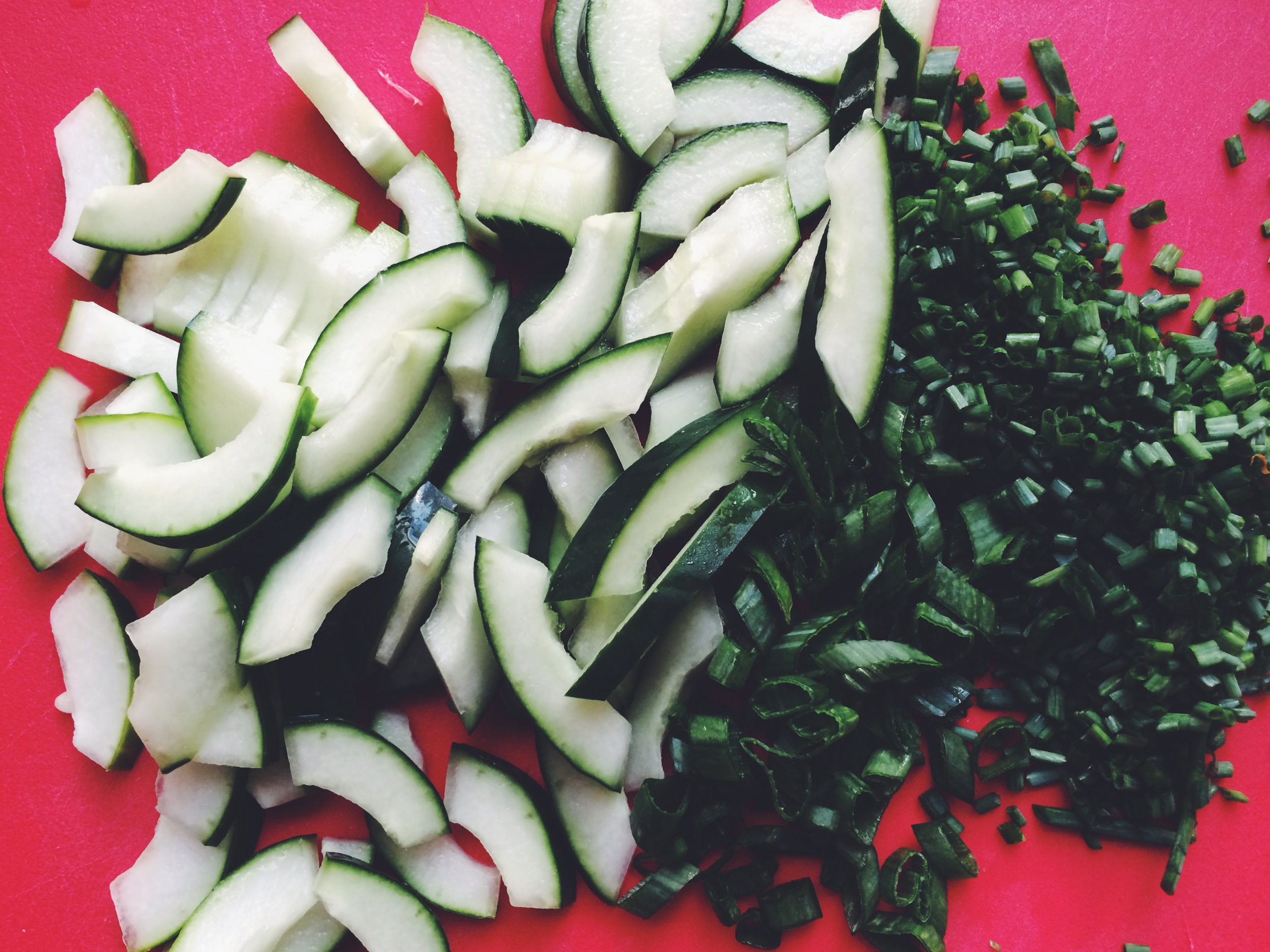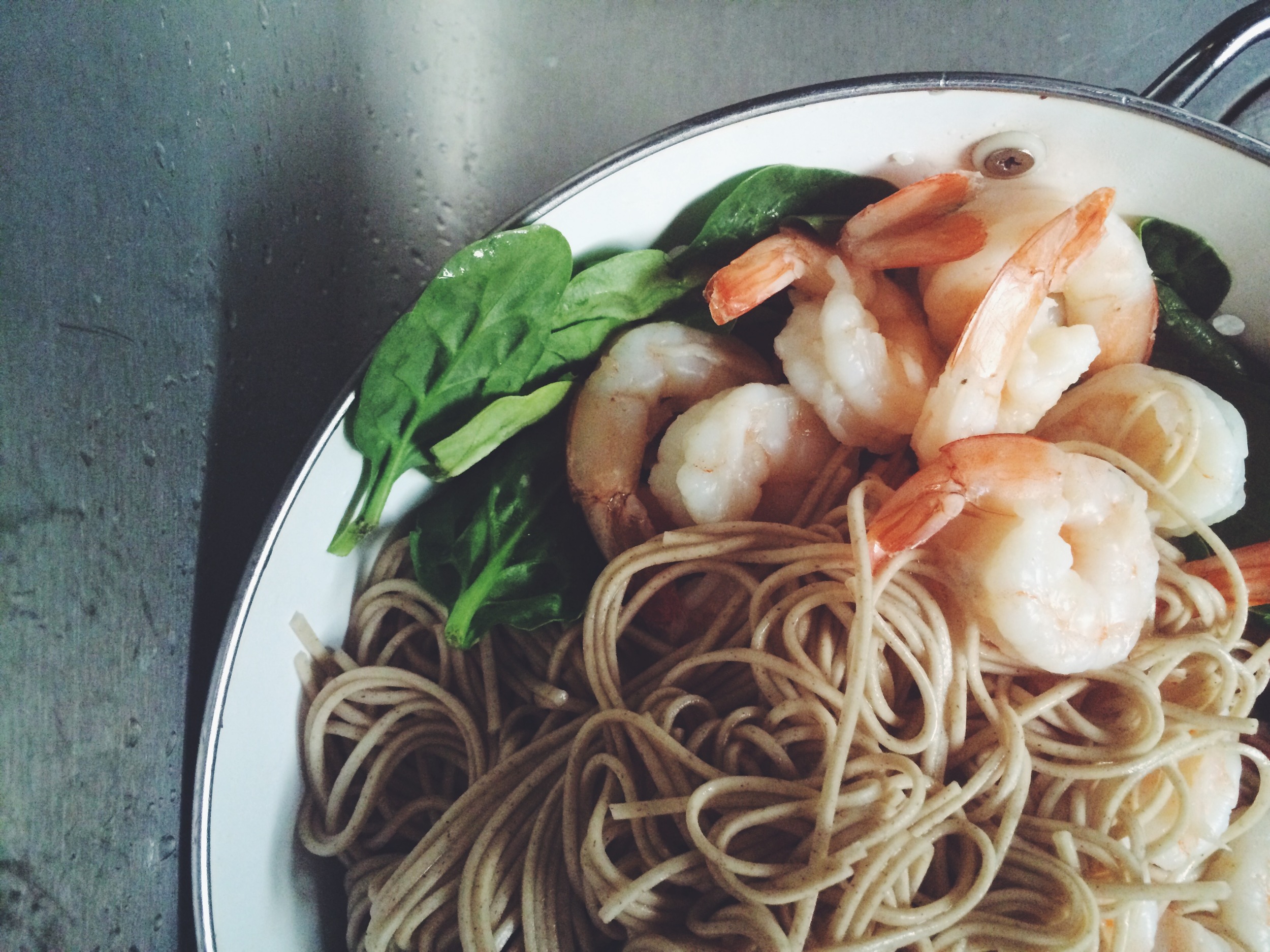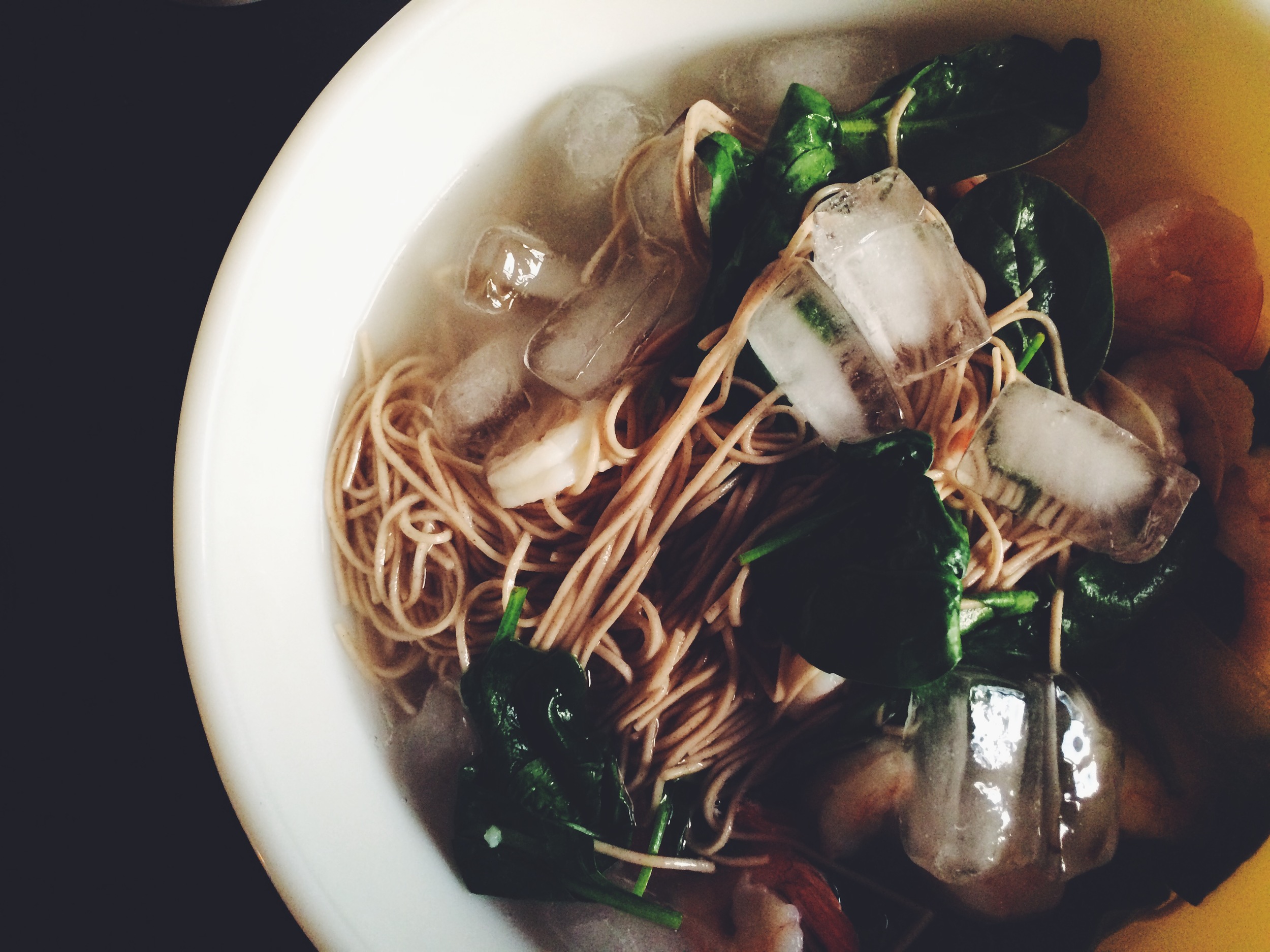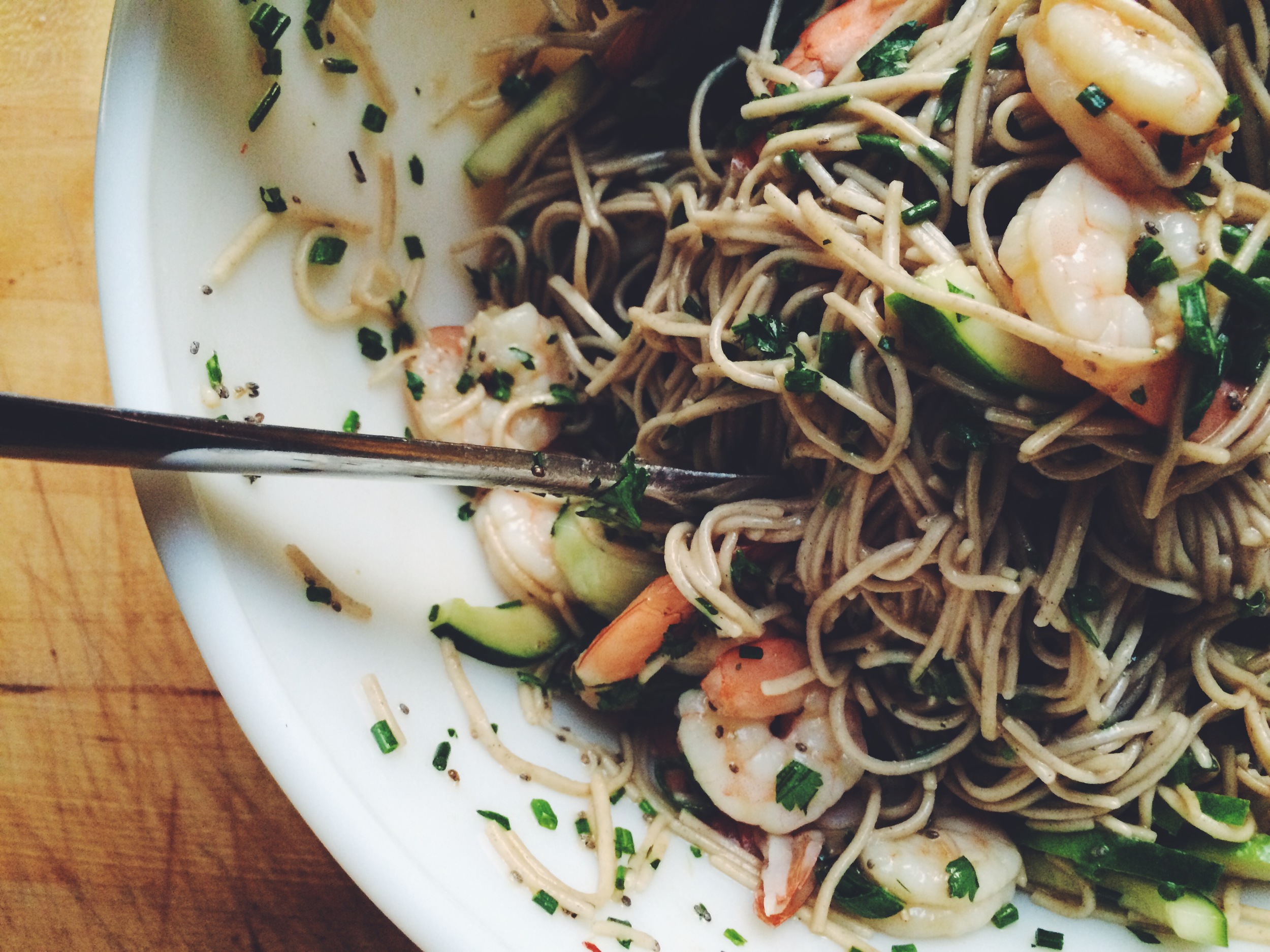In the kitchen there are secret pleasures, like the scent of the garbage disposal after you sneak in the peel of a lemon, or chopping chives in complete silence, or drinking homemade almond milk straight from the bottle while the refrigerator door is still open.
Of course when the house is quiet it's easier to notice these details. To move slowly from the chopping block to the stove to the freezer, being careful not to step on the dog splayed out on your kitchen rug. When I'm alone in the kitchen, and especially when I'm alone for dinner (a somewhat rare occurrence), my senses seem to heighten.
Andrew was finishing a big work project in early October, which kept him late most nights. His office even ordered dinner for the team, so I was cooking for one and would sort of ho hum around the house, going through a list of meals in my head and letting my gut decide what to make for dinner.



One evening, it was a cold noodle salad.
I have a certain affinity for soba noodles, and when my enthusiasm gets out of control it's usually met with a passive aggressive remark such as "soba noodles again?" or "why do you like soba noodles so much?", so I've started leaving more days in between. But being alone I could slurp soba noodles to my heart's content (!), without any judgement.
This being a cold salad, I took steps earlier in the day to prepare. Boiling the noodles and shrimp before leaving for work, chopping cucumbers when I came home for lunch, and even whisking the dressing the night before (overachiever!) so that by the time I came home and shoved Emma around the block for a "walk," dinner was waiting.
Buckwheat is something of a staple in my pantry. Soba noodles are always tucked in a nook, and I adore buckwheat flour in pancakes, so when I happened upon this lovely little poem by Carl Sandburg, it made me consider the plant itself, the "honey-white buckwheat" grown in fields before being ground to a fine, gray powder.
Buckwheat
by Carl Sandburg
There was a late autumn cricket,
And two smoldering mountain sunsets
Under the valley roads of her eyes.
There was a late autumn cricket,
A hangover of summer song,
Scraping a tune
Of the late night clocks of summer,
In the late winter night fireglow,
This in a circle of black velvet at her neck.
In pansy eyes a flash, a thin rim of white light, a beach bonfire
ten miles across dunes, a speck of a fool star in night's half
circle of velvet.
In the corner of the left arm a dimple, a mole, a forget-me-not,
and it fluttered a hummingbird wing, a blur in the honey-red
clover, in the honey-white buckwheat.
From Smoke & Steel
It's a love poem, both for the season and the speaker's beloved. Full of personal details, the poem still invites you in like a rush of wind. When I close my eyes I stand on the dunes not far from my house, the remnants of a beach bonfire smoking below. And it being autumn there is a chill, but also an overwhelming, expansive beauty, captured so eloquently on the page.
And we must say a little something about how the poem ends on the word buckwheat. The honey-white buckwheat plant, the source point. Our ceramic cups dive deep into flour bags and emerge with a decidedly different version of the poem's buckwheat. What a good reminder to spend what little time we have left of the season in absolute awe of the hummingbirds, the moles, and the "smoldering mountain sunsets."
COLD SOBA SALAD WITH SHRIMP
Recipe adapted from Aida Mollenkamp
I came across this recipe on Twitter of all places. And I say that with a dash of surprise because of the limited amount of time I spend there these days. It was good fortune to see the link when I did, because it made for a very satisfying meal, and one I look forward to making again. (I also love her trick of poaching the shrimp in the same pot while the noodles are cooking!)
A few minor recipe tweaks ensued, mostly due to the fact that I forgot to bring home snow peas and the green onions I thought were fresh were beyond saving by the time I opened the crisper. Luckily, this is a recipe well suited to light adaptations.
For the noodles:
8 ounces dried soba noodles
1 tablespoon kosher salt
1 pound (about 24) shrimp, shelled and deveined
2 big handfuls of spinach
6 ounces snow peas, cut on bias into 1-inch pieces
2 Persian cucumbers, trimmed, halved lengthwise, and thinly sliced
1 bunch of chives, finely chopped
2 tablespoons toasted sesame seeds or chia seeds (pictured)
For the dressing:
1/4 cup seasoned rice vinegar
3 tablespoons freshly squeezed lemon juice
1 teaspoon lemon zest
2 tablespoon low-sodium soy sauce
2 to 3 teaspoons honey
1 tablespoon toasted sesame oil
2 inch piece ginger, peeled and grated
3 tablespoons canola oil
Bring a large pot of water to a boil over high heat. Fill a bowl halfway with ice water and set aside. (It's tempting to skip this step, but it will make a difference and really help the noodles cool down.)
When the water is boiling, add the noodles and cook for about 3 minutes, then add the salt and shrimp and continue cooking until the shrimp are pink and firm, about 3 minutes more. Put the spinach in the bottom of a colander, then drain the shrimp and noodles over the top. The heat will help wilt the spinach.
Place everything in the ice water and cool completely, at least 20 minutes.
To make the dressing, add everything except the oil in a food processor. Process until smooth, then drizzle in the oils. Drain the noodles, shrimp, and spinach (pick out any remaining ice if you need to), and add the cucumber and chives. Pour on the dressing and toss to coat. Garnish with the sesame or chia seeds and serve.




